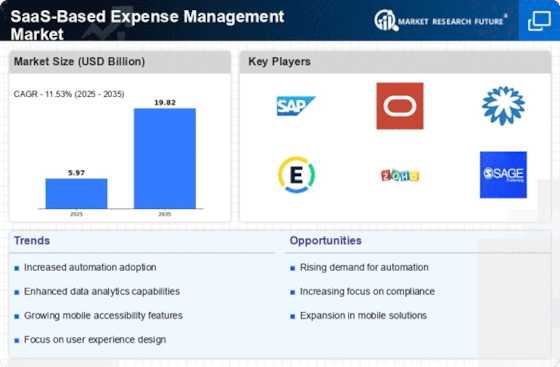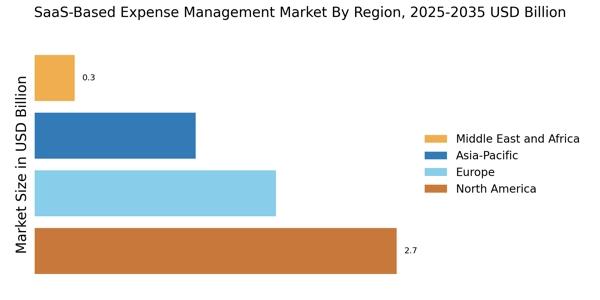Rise of Remote Work Culture
The shift towards remote work has significantly influenced the SaaS-Based Expense Management Market. As organizations adapt to flexible work arrangements, the need for efficient expense tracking and management has become paramount. Remote employees often incur various expenses that require meticulous tracking and reimbursement processes. The SaaS solutions provide a centralized platform for managing these expenses, ensuring compliance and accuracy. Recent statistics suggest that companies leveraging SaaS-based expense management tools have improved their reimbursement timelines by 40%, thereby enhancing employee satisfaction and operational efficiency.
Enhanced Data Security Measures
Data security remains a critical concern for organizations utilizing SaaS solutions, particularly in the SaaS-Based Expense Management Market. As cyber threats evolve, companies are prioritizing platforms that offer robust security features to protect sensitive financial information. SaaS providers are increasingly investing in advanced security protocols, including encryption and multi-factor authentication, to safeguard user data. This focus on security is likely to drive market growth, as organizations seek to mitigate risks associated with data breaches, with an estimated increase in market size by 20% over the next three years.
Increased Demand for Cost Control
The SaaS-Based Expense Management Market is witnessing a pronounced demand for cost control solutions. Organizations are increasingly seeking ways to optimize their spending and enhance financial visibility. This trend is driven by the need to manage operational costs effectively, as businesses strive to maintain profitability in a competitive landscape. According to recent data, companies utilizing SaaS-based solutions have reported a reduction in expenses by up to 30%. This indicates that the adoption of these platforms is not merely a trend but a strategic necessity for many organizations aiming to streamline their financial processes.
Integration with Emerging Technologies
The integration of emerging technologies such as artificial intelligence and machine learning is reshaping the SaaS-Based Expense Management Market. These technologies enable advanced data analytics, automating expense categorization and fraud detection. By leveraging AI, organizations can gain deeper insights into spending patterns, which can inform strategic decision-making. The market for AI-driven expense management solutions is projected to grow at a compound annual growth rate of 25% over the next five years, indicating a robust shift towards technology-driven financial management solutions.
Regulatory Compliance and Risk Management
In an increasingly regulated environment, the SaaS-Based Expense Management Market is experiencing heightened focus on compliance and risk management. Organizations are required to adhere to various financial regulations, necessitating robust expense management systems that ensure compliance. SaaS solutions offer features that facilitate adherence to these regulations, reducing the risk of financial penalties. As businesses face scrutiny from regulatory bodies, the demand for compliant expense management solutions is expected to rise, with a projected market growth of 15% in the next two years.

















